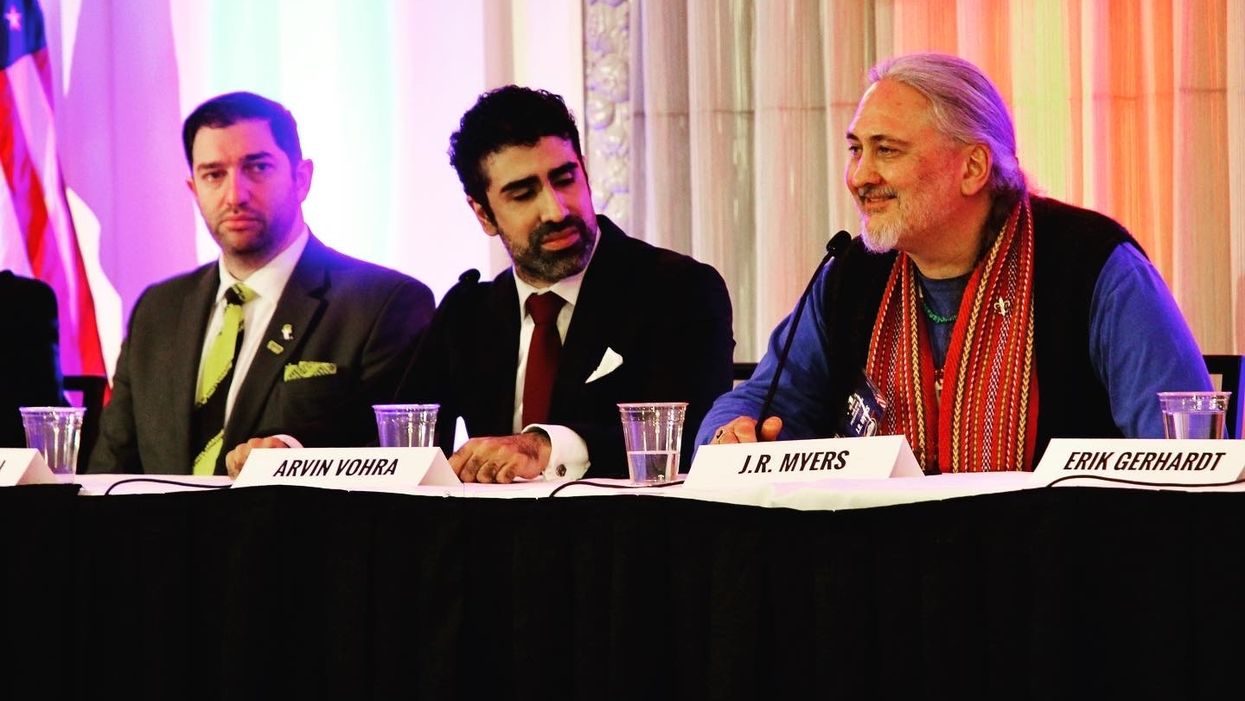Griffiths is a contributing writer.
While the Democratic contest was quickly condensing into a two-man race, 18 minimally known presidential aspirants were convening for a sprawling discussion on Wednesday.
Though billed as a debate among independents, organizers said the gathering was really more an intervention on a broken system — a moment to give candidates on the margins an opportunity to rail against the Republican and Democratic duopoly, and to show how rivals can discuss policies more civilly than the polarized shouting that marks so much political discourse.
"One thing that's clear is that the political system we have right now is not serving us well. Worst of all, it doesn't even allow for straightforward solutions to be part of the conversation. That's why we're creating this platform for a new national dialogue," said Christina Tobin, who created the Free and Equal Elections Foundation, which staged the livestreamed event at a hotel in downtown Chicago.
To create a more comprehensive discussion and a more thoughtful tone, where sound bites were not necessary for candidates unspooling views that stretched across the ideological spectrum, Tobin moderated a pair of debates among nine candidates each – both of them lasting three and a half hours.
"There's a large and growing political reform wave that is slowly but surely winning transformational changes at the local level, but you wouldn't know it from listening to the mainstream political coverage. It's past time for democracy itself to be part of the national conversation," said Eli Beckerman, founder of Open The Debates, the debate's co-host.
Though the debate included topics that ranged from the Israeli-Palestinian conflict to mandatory vaccinations, the conversation largely focused on political reform and the obstacles third-party and independent candidates face nationwide -- starting with the fall presidential debates.
"Democrats and Republicans will stop at nothing to squash any other voice from being heard," said Libertarian Jo Jorgensen. "It's how they stay in power. What most Americans don't realize is that the debate commission is a wholly owned subsidiary of the Republican and Democratic parties."
While venting frustration at rules that restrict access to the nationally televised debates, candidates also deliberated the finer points of an array of other proposals for making the political process more democratic and representative of the national will: ranked-choice voting, the rival alternative called approval voting, efforts to make it easier for partisan outsiders to get on the ballot, public financing of campaigns, regulating money in politics and various plans for altering the rules of the Electoral College.
"Our country is in crisis. But it's not the first time we've ever been in crisis. I've spent my career teaching American history. And every time that we have a period of crisis we also have a period of creativity, where lots of new ideas pop up, and many of those ideas pop up from third parties," said American Solidarity Party nominee Brian Carroll.
"I think we need more transparency in our current system first, and more options to be used at the local level. We need to really think this through," Libertarian Erik Gerhardt said in urging a go-slow approach to a nationwide refashioning of the election system,.
The debate was notable for how infrequently the candidates talked beyond their two-minute limits, interrupted one another, spoke out of turn or made a disparaging comment about somebody else on stage.
Organizers made an effort to exclude dozens of people who say they're running for president on the true margins of reality. More than two-dozen people qualified for an invitation because they are seeking the nominations of one of the five parties that have primaries and are on the ballot in at least two states — Republican, Democratic, Libertarian, Green and Constitution — or are independents running the bureaucratic traps to get on the ballots of at least two states.
The candidates with hope of gaining some traction for their cause often point to a recent USA Today survey in which 65 percent said they support"making it easier for third-party and independent candidates to run for office."
Independent Mark Charles, a member of the Navajo Nation, said he thought the event provided "a dialogue that our nation's simplistic two-party system does not know how to have."
Tobin said she hopes the event is the beginning of a tour of open presidential debates that are inclusive and focused on solutions. FEEF has not announced when or where a second event might take place.




















Marco Rubio is the only adult left in the room